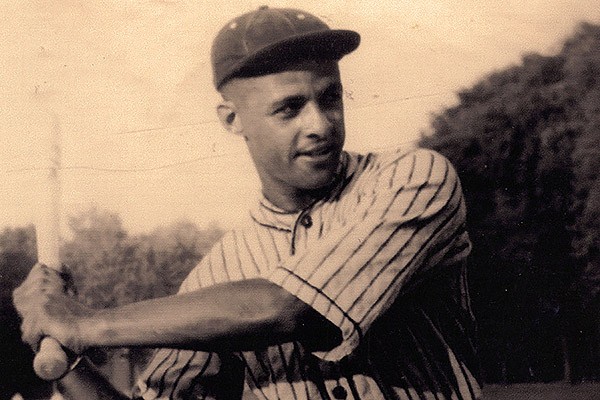 Wilfred (Boomer) Harding, a pioneering multi-sport athlete, is the subject of a retrospective project by UWindsor researchers.
Wilfred (Boomer) Harding, a pioneering multi-sport athlete, is the subject of a retrospective project by UWindsor researchers.
A retrospective on the career of a Chatham athlete who broke multiple racial barriers in the early 20th century will be featured on the Leddy Library’s Centre for Digital Scholarship website in 2017.
Breaking the Colour Barrier will document the life of sports legend and Second World War veteran Wilfred (Boomer) Harding. The first black hockey player in the International Hockey League when he joined the Windsor Staffords in 1946, he was also the first to play at Detroit’s Olympia stadium. Harding, born in 1915, was also a member of the Chatham Coloured All-Stars —the first black team to win an Ontario Baseball Association championship in 1934.
Heidi Jacobs, information literacy librarian, and Miriam Wright, head of the Department of History, are collaborating on the website and digital archive that will document Harding’s life and career using documents and mementos from family scrapbooks. Members of the Harding family lent the researchers their collection so it could be digitized and become the basis of the website and digital archive. Collected by multiple generations of Harding’s family, the scrapbooks contain seven decades’ worth of newspaper clippings, team photographs, programs, letters, and medals.
Over the summer and fall, an Undergraduate Research Experience grant allowed undergraduate history students Lauren Miceli and Kayla Dettinger to scan the scrapbooks and research aspects of Harding’s history and context. They presented their work on the project at the UWill Discover undergraduate research conference in March.
Additionally, Leddy librarian Dave Johnston and history research associate Cal Murgu developed a digital archive so that the digitized documents will be preserved on a long-term basis. They also helped build a website, which they hope to launch in 2017, to highlight and contextualize some of the materials in thematic exhibits.
“Digitization will help preserve these fragile documents for future generations and make them accessible,” says Dr. Jacobs. “This is a rare opportunity for local history enthusiasts, students, and seasoned researchers to learn about Boomer’s life, which is not just a story about sport, or race, but an intersectional narrative of human struggle, perseverance, and success.”
Dr. Wright says there is little written about Canadian black sports history, and outside of Chatham, few people know about Harding or the Chatham Coloured All-Stars. She says sports are a reflection of society and show the same struggles, conflicts and divisions found in daily life. Despite their athletic successes, Harding and his All-Stars teammates regularly faced discrimination both on and off the field.
“It’s important to acknowledge Harding’s story and that of the Chatham Coloured All Stars because people often assume these types of racial barriers never existed in Canada,” Wright says.
The UWindsor researchers partnered with the Chatham Sports Hall of Fame and have received an Ontario Trillium Foundation grant worth $72,500 to develop the site and digital archive and to add an oral history component. Jacobs says they and students they hope to involve in the project will interview family members about Harding, who died in 1991, as well as family members of the other Chatham Coloured All-Stars players to get their stories and experiences.
“As a young man, Boomer was turned away from a public skating event at Detroit’s Olympia Stadium, but just a few years later he came back to the same arena and played on that very ice as the first black player in the IHL—it was a bittersweet moment,” says Jacobs. “These stories will be lost if we don’t do the oral history project.”
Jacobs and Wright are giving a talk on the project at a meeting of the Essex County Black Historical Research Society on April 21, 7 p.m. in the United Way building, 300 Giles Boulevard East. They also plan to work with local school boards to create instructional materials for the site that will be compatible with curriculum for kindergarten to grade 12.
“Sports are community builders and in the 1920s and ’30s African-Canadian athletes started organizing teams. Despite the barriers, they were creating a strong community identity and sense of achievement,” says Wright. “At the same time, grassroots groups were forming to fight for civil rights. There’s a lot to learn by looking at these stories.”
